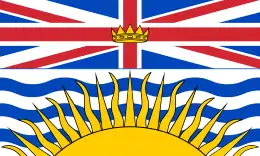Executive Council of British Columbia
The Executive Council of British Columbia (informally and more commonly, the British Columbia Cabinet) is the Cabinet of the Canadian province of British Columbia.
| Executive council overview | |
|---|---|
| Formed | July 20, 1871 |
| Type | Advisory body |
| Headquarters | British Columbia Parliament Buildings, Victoria, British Columbia, Canada |
| Employees | 24 members: |
| Executive council executives | |
| Website | www2.gov.bc.ca |
Almost always made up of members of the Legislative Assembly of British Columbia, the Cabinet is similar in structure and role to the Cabinet of Canada while being smaller in size. As federal and provincial responsibilities differ, there are a number of different portfolios between the federal and provincial governments.
The lieutenant governor of British Columbia, as representative of the Queen in Right of British Columbia, heads the council, and is referred to as the lieutenant governor in Council. Other members of the Cabinet, who advise, or minister, the vice-regal, are selected by the premier of British Columbia and appointed by the lieutenant governor. Most cabinet ministers are the head of a ministry, but this is not always the case.
History
Prior to their union in 1866, the Executive Councils of the separate crown colonies of British Columbia and Vancouver Island were largely appointed by the Governor and included military and judicial officials, their role that of the Governor's cabinet, similar to the present except that the Governor took part in cabinet meetings and political decisions, which a lieutenant governor does not. The colonial Legislative Assemblies were subordinate to the governor and the Council and served more as a sounding-board than a legislative body.
As at the federal level, the most important Cabinet post after that of the leader is Minister of Finance, although notably during the regimes of Premiers W.A.C. Bennett and Dave Barrett that position was conjoint with that of the premier. Today the next most powerful positions are the Forestry and Health portfolios which have huge budgets and are of central political importance. Other powerful portfolios include Education, Health, and Energy, Mines and Petroleum Resources.
Cabinet
The second ministry of John Horgan was sworn in by Lieutenant Governor Janet Austin on November 26, 2020. The current Cabinet consists of members of the Legislative Assembly representing the province's governing party, the British Columbia New Democratic Party. Composition current as of November 2020.[1]
| Lieutenant governor | Term | |
|---|---|---|
| Her Honour the Honourable Janet Austin | (2018–present) | |
| Portfolio | Minister | Term |
| Premier of British Columbia | John Horgan | (2017–present) |
| Minister of Advanced Education, Skills and Training | Anne Kang | (since 2020) |
| Minister of Agriculture, Food and Fisheries | Lana Popham | (2017–present) |
| Minister of State for Child Care | Katrina Chen | (2017–present) |
| Minister of Children and Family Development | Mitzi Dean | (since 2020) |
| Minister of Citizens' Services | Lisa Beare | (since 2020) |
| Minister of Education | Jennifer Whiteside | (since 2020) |
| Minister of Energy, Mines and Low Carbon Innovation (and the Consular Corps of BC) | Bruce Ralston | (2017–present) |
| Minister of Environment and Climate Change Strategy (including TransLink) | George Heyman | (2017–present) |
| Minister of Finance | Selina Robinson | (since 2020) |
| Minister of Forests, Lands, Natural Resource Operations and Rural Development | Katrine Conroy | (since 2020) |
| Minister of Health (and Francophone Affairs) | Adrian Dix | (2017–present) |
| Minister of Housing and Attorney General of British Columbia | David Eby | (2017–present) |
| Minister of Indigenous Relations and Reconciliation | Murray Rankin | (since 2020) |
| Minister of State for Infrastructure | Bowinn Ma | (since 2020) |
| Minister of Jobs, Economic Recovery and Innovation | Ravi Kahlon | (since 2020) |
| Minister of Labour | Harry Bains | (2017–present) |
| Minister of State for Lands and Natural Resources Operations | Nathan Cullen | (since 2020) |
| Minister of Mental Health and Addictions | Sheila Malcolmson | (since 2020) |
| Minister of Municipal Affairs | Josie Osborne | (since 2020) |
| Minister of Public Safety and Solicitor General | Mike Farnworth | (2017–present) |
| Minister of Social Development and Poverty Reduction | Nicholas Simons | (since 2020) |
| Minister of Tourism, Arts, Culture and Sport | Melanie Mark | (since 2020) |
| Minister of State for Trade | George Chow | (2017–present) |
| Minister of Transportation and Infrastructure | Rob Fleming | (since 2020) |
| Secretary to Cabinet | Don Wright | (2017–present) |
References
- "Executive Council of the B.C. Government". www2.gov.bc.ca. Retrieved October 14, 2020.
